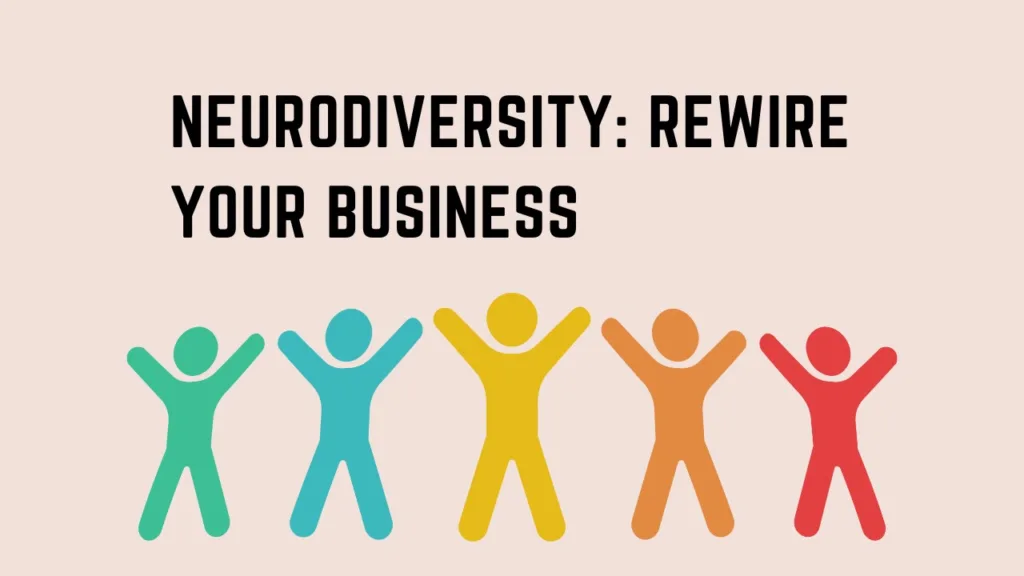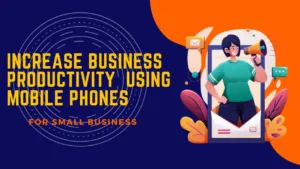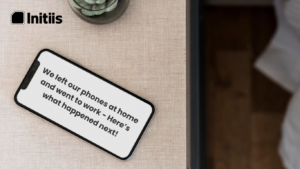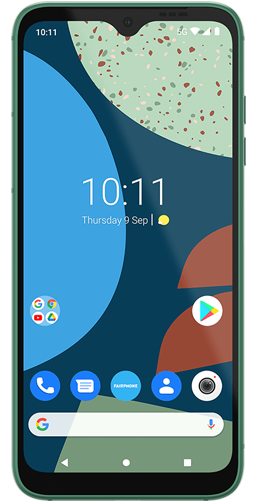On the back of our recent ‘Workplace Disability’ blog, which was epic (bit wordy; I hear you), we thought we’d blog specifically on neurodiversity in the workplace.
So, for all our neurodivergent readers out there, we’ll try and cut out the small talk for this one.
You’re in a meeting.
You’re unsettled because you don’t usually have meetings on a Tuesday. You’re feeling agitated because the lift was full; someone’s shoulder brushed against your shoulder, and the person next to you was eating crisps.
The ceiling lights are too bright. Someone by the window is tapping their pencil.
The words on the whiteboard are shifting and don’t make sense.
You can’t concentrate. You can’t think. You need to get out.
For many people who are neurodivergent, the above workplace scenario is all too familiar. Sensory overload and social anxiety can be enough to make any workplace unbearable and inaccessible.
What is neurodiversity?
Neurodiversity refers to the different ways in which a person’s brain processes information. For those who are neurodivergent, the way they interact with and perceive the world, may be different from that of a neurotypical person.
Neurodiversity can include the following conditions:
- Autism or ASD (Autism Spectrum Disorder) – social and communication difficulties. Obsessive interests.
- ADHD – hyperactivity, impulsiveness, concentration difficulties.
- Dyspraxia – poor spatial awareness, coordination and movement difficulties.
- Dyscalculia – difficulties with numbers and calculations.
- Dyslexia – difficulties with words, speaking, spelling, reading.
- Tourette’s – physical and verbal tics.
The characteristics listed above are just some presentations of a particular condition, although, as many people have a dual diagnosis, presentation can really vary.
The saying goes: if you’ve met one person with autism, you’ve met one person with autism.
Because autism is a spectrum disorder, no two autistic people will present the same, with someone with mild autism or Asperger’s (think Young Sheldon) at one end of the spectrum, and someone with severe or classic autism, who may be non-verbal or care-dependant, at the other end.
As an employer, it is always essential practice to achieve a good understanding of the people you work with, whether they are neurodivergent or neurotypical, so preparing to support someone who is neurodivergent, really shouldn’t be any different – excuse the pun.
All employees are unique, and everyone should be made to feel comfortable to bring all of themselves into work.
The Facts…
It is estimated that almost 20% of the world’s population is neurodivergent, so that’s, potentially, 20% of employees and 20% of your customers/clients.
Around 40% of neurodivergent people are unemployed, and around 80% of those who are employed, are considered underemployed.
The Benefits of Neurodiversity for your Business
It’s a fact that many of the greatest achievements in human history were made by neurodiverse individuals: Bill Gates, Albert Einstein, Steve Jobs…
It is widely accepted by scholars and biographers that Alan Turing, one of the most brilliant mathematicians of the last century, presented with high-functioning autism due to his social awkwardness and communication difficulties, together with his obsessive attention to detail and pattern in his work.
As Dr Temple Grandin, a prominent autistic author and speaker on autism, suggests: it probably wasn’t the neurotypicals chatting around the campfire who invented the wheel.
What some people can lack in terms of social skills, they massively make up for in problem-solving abilities, retention of information, attention to detail, or identifying trends and obscure patterns that others may not see.
Neurodivergent people can be very creative due to having to navigate an often confusing world. They are likely to be work-driven, punctual, reliable, passionate about their interests, hold an incredible knowledgebase, and are often very aware of their own strengths and weaknesses.
Someone who thinks differently and sees the world differently, can be a refreshing and innovative addition to your team.
How to attract different minds…
Many aspects of the job application process could deter someone with conditions like autism or dyslexia from applying to your business.
Be mindful that many people who are neurodivergent will have come through a school system that has left them lacking confidence in their abilities.
To refer again to Temple Grandin, who has also achieved a successful career in design, she recalls how she would have to rely on selling her work to employers, rather than selling herself, when applying for jobs in the early days.
A neurodivergent person may not have the ‘gift of the gab’, but the gifts they could bring to your business, could prove to be extraordinary.
The Job Advert…
When advertising for a role within your business, think carefully and honestly about the skills that the job absolutely requires. For example, does a sales position require excellent written English? Does an IT technician position need someone who is highly articulate and socially flexible? If the answer is no, leave it out of the advert and give someone who is, maybe, dyslexic or autistic, the confidence to apply for the role.
Some people who are dyslexic or autistic may find reading and/or writing difficult, so consider providing application forms on different coloured paper, simplify the language you use, and consider using tick boxes to answer questions, or create an online application form.
Contact local organisations that support neurodivergent individuals about your job vacancy, or speak to an SEN (Special Educational Needs) co-ordinator at a local college about job opportunities and apprentices with your business.
Some of these organisations will also be able to provide training to your team on neurodiversity or autism in the workplace, which will benefit every mind in your business.
At the Interview stage…
Be mindful that some people may not interview well, especially people who find social situations difficult.
Offer to conduct the first interview over the telephone or virtually, as well as the usual face-to-face scenario, to make the interview accessible for as many neurodivergent applicants as possible.
Ensure that all interview details are clear and adhered to, such as time, place, who they will meet, etc. If possible, offer interviewees the chance to visit the workspace before the interview to make it seem less daunting.
Ensure the interview room is a quiet space with soft lighting, and hold back on inviting all the directors on the board along to ask questions – terrifying!
It would be useful to give neurodiverse applicants the interview questions beforehand: the unexpected can sometimes be problematic. Interview questions should be kept straightforward and not hypothetical or ambiguous, to avoid confusion.
‘If a customer came in with a complaint, how would you handle it?’
This would be a hypothetical question and could be approached instead like this:
‘Tell me about a time when a customer came in with a complaint. How did you handle it?’
Some neurodiverse people also take comments and questions literally, so language must be kept simple and factual.
‘How did you find your last job?’
‘With a map…?’
Be prepared for the possibility that not everyone will feel comfortable making eye contact at interview, and always give the interviewee a choice of where they would like to sit. Some autistic people do not like to sit facing someone else for too long.
For those who have communication difficulties, consider give them a small task through which they can demonstrate their abilities beyond the interview situation. Maybe go as far as offering a trial day.
Give them the opportunity to sell their skills to you in the best way they can.
How to support a neurodivergent employee…
So, you’ve taken on someone who is autistic and dyslexic to be the latest member of your team. You have ascertained that they are highly skilled, knowledgeable, intelligent, and incredibly keen to fulfil what the role requires of them.
How do you now support their needs in the workplace?
Whether neurodivergent or neurotypical, often a new employee will not want to make any requests on day one for fear of being a nuisance.
As an employer or line manager, it would be proactive to anticipate their needs at this point, and then regularly touch base with them to see if any adjustments need to be made.
Consider the following:
Some neurodivergent people have sensory processing difficulties, making them more sensitive to sounds, smells, light, etc. Try to offer them a quieter workspace with little distractions, maybe away from any strong smells, such as the kitchen. Offer desk dividers, ear defenders, appropriate computer software to support writing difficulties, softer lighting and window blinds.
Sometimes the smallest detail can make all the difference to someone’s day and ability to work effectively.
Consider your new employee’s commute to and from work, as this could prove to be the most stressful part of their day. If hiring through an organisation or college, speak with them about how they can assist and advise on transport. Many autistic adults will still rely on parents for transport, so building a good relationship with the family may prove beneficial.
Many neurodivergent employees can struggle with executive functioning: a set of skills that includes planning, organising, impulse control, flexible thinking, staying focused, and following instructions.
Many neurodivergent employees will benefit from a set workday routine. They will feel more comfortable to know when things are going to happen and how long they will take, and that this is unlikely to change. It is important to timetable in regular physical breaks and food breaks to ensure everyone has adequate time out in the fresh air, or away from their screens. Some neurodivergent employees may become so engrossed in a project that they suddenly reach physical and mental burnout.
Providing visual timetables can help those with reading difficulties, or visual thinkers, to organise their workdays; this could benefit the entire team.
Also, by giving structure and planning to the working day/week, such as distributing agendas ahead of meetings, or providing clear deadlines, you can support all your employees to organise their day and their workload more effectively.
Consider offering remote working, or out-of-hours working, to some employees to minimise sensory burnout and increase productivity. Observe your team members, especially those who find communicating difficult – don’t leave it too late to make adjustments.
Many people benefit from a mentor or a ‘safe person’ in the workplace who they can talk to about any worries or questions they may have. A suitable mentor can provide a neurodivergent employee with reassurance, sensitive feedback, regular check-ins, and job training.
For those who have a diagnosis such as autism or ADHD, or for those team members who are undiagnosed but find the world a difficult place to navigate sometimes, organising corporate training workshops in neurodiversity will help every member of the team, and create harmony and understanding amongst colleagues.
For more information and ideas on becoming a neuro-inclusive employer, link up with Dan Harris at: www.neurodiversityinbusiness.org.
Remember, our workplace is already a place of neurodiversity.
We all have different minds; we all think in different ways; let’s embrace that.
To finish…
A neuro-inclusive business is one that benefits from vast recruitment opportunities, a highly-skilled, creative, innovative and unique workforce, high employee retention due to workplace satisfaction, and more positive interactions with both colleagues and customers.
A neuro-inclusive recruitment process and workplace will benefit everyone.
To quote Temple Grandin, ‘The world needs all kinds of minds.’ Rewire your business.







